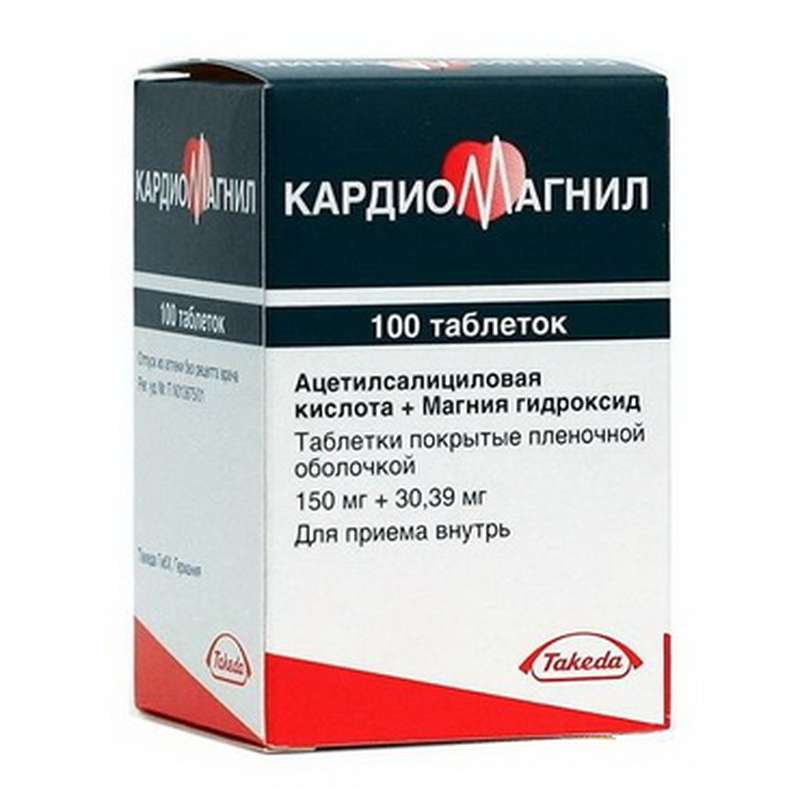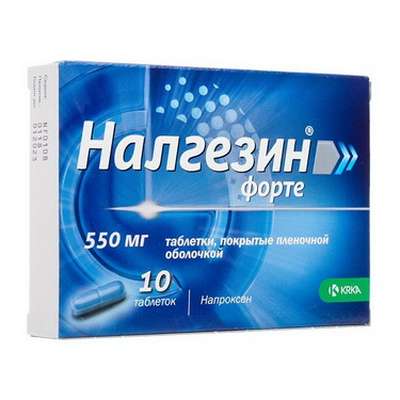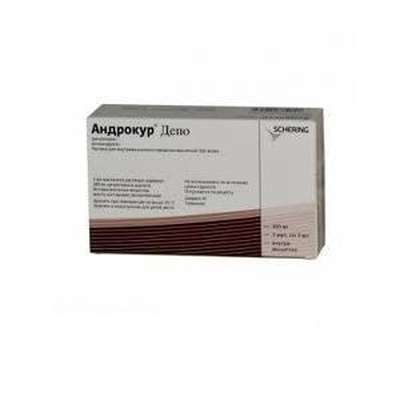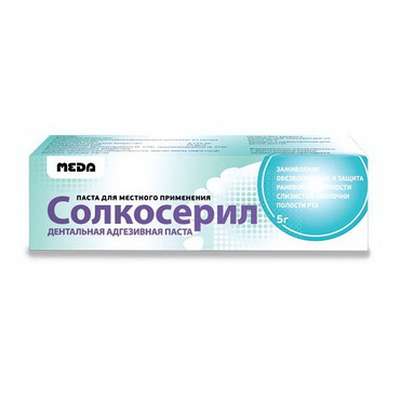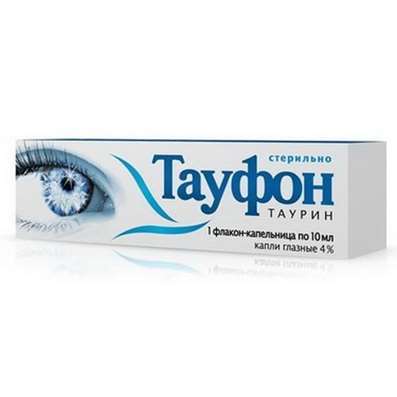Acetylsalicylic acid irreversibly inhibits the enzyme cyclooxygenase and selectively reduces the synthesis of thromboxane A2, which leads to a decrease in platelet aggregation and a decrease in blood coagulability.
Magnesium hydroxide protects the mucous membranes of the digestive tract, which reduces the risk of side effects.
NSAIDs, antiaggregant. The mechanism of action of acetylsalicylic acid is irreversible inhibition of the enzyme COX-1, which blocks the synthesis of thromboxane A2 and suppresses platelet aggregation. It is believed that acetylsalicylic acid has other mechanisms for suppressing platelet aggregation, which expands its use in various vascular diseases. Acetylsalicylic acid also has an anti-inflammatory, analgesic and antipyretic effect.
Magnesium hydroxide, which is part of the Cardiomagnyl, protects the mucous membrane of the gastrointestinal tract from the effects of acetylsalicylic acid.
Indications:
- Primary prevention of cardiovascular diseases such as thrombosis and acute heart failure in the presence of risk factors (eg diabetes, hyperlipidemia, hypertension, obesity, smoking, old age);
- prevention of recurrent myocardial infarction and thrombosis of blood vessels;
- prevention of thromboembolism after surgical interventions on vessels (coronary artery bypass grafting, percutaneous transluminal coronary angioplasty);
- unstable angina.
Contraindications:
- Hypersensitivity to ASA, excipients Cardiomagnyl and other NSAIDs;
- hemorrhage in the brain;
- propensity to bleed (insufficiency of vitamin K, thrombocytopenia, hemorrhagic diathesis);
- The bronchial asthma, induced by the intake of salicylates and NSAIDs;
- erosive-ulcerative lesion of the gastrointestinal tract (in the phase of exacerbation);
- gastrointestinal bleeding;
- severe renal failure (Cl creatinine - <10 ml / min);
- pregnancy (I and III trimesters);
- lactation period;
- deficiency of glucose-6-phosphate dehydrogenase;
- simultaneous reception with methotrexate (> 15 mg per week);
- children's age till 18 years.
With caution should prescribe the drug for gout, hyperuricemia, the presence of an anamnesis of gastrointestinal lesions or bleeding from the gastrointestinal tract, with renal and / or liver failure, bronchial asthma, hay fever, nasal polyposis, allergic conditions, in the second trimester of pregnancy.
Suggested Use:
Tablets should be swallowed whole, washed down with water. If desired, the tablet can be broken in half, chewed or pre-grated.
For primary prevention of cardiovascular diseases, such as thrombosis and acute heart failure in the presence of risk factors (for example, diabetes mellitus, hyperlipidemia, hypertension, obesity, smoking, elderly age) appoint 1 tab. Cardiomagnyl containing acetylsalicylic acid in a dose of 150 mg in the first day, then 1 tab. Cardiomagnyl, containing acetylsalicylic acid in a dose of 75 mg 1 time / day.
For the prevention of repeated myocardial infarction and thrombosis of blood vessels, 1 tablet is prescribed. Cardiomagnyl, containing acetylsalicylic acid in a dose of 75-150 mg 1 time / day.
For prophylaxis of thromboembolism after surgical interventions on vessels (aortocoronary shunting, percutaneous transluminal coronary angioplasty) appoint 1 tab. Cardiomagnyl, containing acetylsalicylic acid in a dose of 75-150 mg 1 time / day.
With unstable angina, appoint 1 tab. Cardiomagnyl, containing acetylsalicylic acid in a dose of 75-150 mg 1 time / day.
Special instructions:
Take the drug Cardiomagnyl should be after the appointment of a doctor.
Acetylsalicylic acid can provoke bronchospasm, as well as cause attacks of bronchial asthma and other reactions of hypersensitivity. Risk factors are the presence of bronchial asthma in history, hay fever, nasal polyposis, chronic diseases of the respiratory system, as well as allergic reactions (for example, skin reactions, pruritus, urticaria) to other drugs.
Acetylsalicylic acid can cause bleeding of varying severity during and after surgical interventions.
A few days before the planned surgery, the risk of bleeding should be assessed compared with the risk of developing ischemic complications in patients taking low doses of acetylsalicylic acid. If the risk of bleeding is significant, the intake of acetylsalicylic acid should be temporarily discontinued.
The combination of acetylsalicylic acid with anticoagulants, thrombolytics and antiplatelet drugs is accompanied by an increased risk of bleeding.
The intake of acetylsalicylic acid in low doses can provoke the development of gout in predisposed individuals (having decreased uric acid excretion).
The combination of acetylsalicylic acid with methotrexate is accompanied by an increased incidence of side effects from the hematopoiesis.
Acetylsalicylic acid in high doses has a hypoglycemic effect, which must be borne in mind when prescribing it to patients with diabetes mellitus receiving hypoglycemic agents for ingestion and insulin.
When combined use of systemic GCS and salicylates should be remembered that during treatment, the concentration of salicylates in the blood is reduced, and after the abolition of systemic SCS, an overdose of salicylates is possible.
It is not recommended to combine acetylsalicylic acid with ibuprofen in patients with an increased risk of cardiovascular disease: when combined with ibuprofen, a decrease in the antiplatelet effect of acetylsalicylic acid in doses up to 300 mg is observed, which leads to a decrease in the cardioprotective effects of acetylsalicylic acid.
Exceeding the dose of acetylsalicylic acid with more recommended therapeutic doses is associated with a risk of gastrointestinal bleeding.
With long-term use of acetylsalicylic acid in low doses as antiplatelet therapy, caution is needed in elderly patients due to the risk of developing gastrointestinal bleeding.
With the simultaneous administration of acetylsalicylic acid with ethanol, the risk of damage to the mucosa of the gastrointestinal tract and prolonging the time of bleeding is increased.
Impact on the ability to drive vehicles and manage mechanisms
During treatment with acetylsalicylic acid, patients should be careful when driving vehicles and engaging in potentially dangerous activities that require a high concentration of attention and speed of psychomotor reactions.
Packaging:
- Comes in original packaging. Item is brand new and unopened.
Storage:
- Keep away from direct sunlight.
- Keep locked and away from children.
- Store in dry place at room temperature.
- Do not exceed storage temperature higher than 25 C
Important notice- the outer box design may vary before prior notice!

 Cart
Cart
